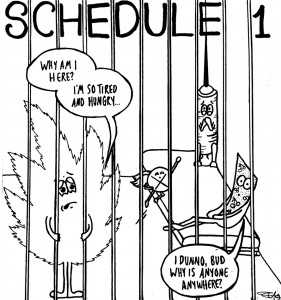Cannabis legalization advances justice
Adelanto, California, is not an ordinary American town.
A sleeping agrarian piece of land tucked away in the Mojave desert, the city has suddenly become the home of some of the most valued pieces of property in California. The recent move to permit commercial cultivation of marijuana has created a massive influx of business activity as businesses race toward using Adelanto’s land to build warehouses for growing operations.
The growth of Adelanto highlights unparalleled opportunities in federal marijuana policy. A previous prison town moving toward bankruptcy, the area is enjoying a considerable increase in real estate value as well as an eminently sustainable model of growth beyond selling its prisons to private incarceration companies. Federal legalization could help resolve prison overcrowding, funnel money into the American economy and act as a first step to break patterns for the policing in black and brown communities.
This California town is not an isolated case. The state of Colorado made more than $180 billion off of marijuana legalization, much of which is to be directed toward schools and — ironically — drug prevention programs. Expected revenues where marijuana is legalized are estimated to be a little more than $3 billion for all states collectively.
Federal policies, however, have consistently hindered progressive policy on marijuana. The current federal stance categorizes the substance as a Schedule I Controlled Substance, placing it in league with meth, heroin and methaqualone. Early investors are unable to use traditional banking services such as checks due to this policy, meaning almost all transactions from individual purchases to deposits on land are paid exclusively in cash.
Even beyond pecuniary benefit, the history of federal policies over marijuana has been riddled with racial and class discrimination. While both white and black Americans smoke marijuana at the same rates, black Americans are arrested 3.73 times more than white Americans. The history of incarceration has more than quadrupled the federal incarceration rate since 1980, serving nobody but corporate leaders directly profiting from an explosion of inmates. “Reasonable doubt” police practices have justified unreasonable searches and police attention toward black and Latino communities unjustifiably beyond normal practice.
The continued support for marijuana criminalization fails to provide real solutions and draws back to ’70s-era “war on drugs” rhetoric. Scholars have proven that overcrowded prison systems run by for-profit companies often fail to provide the “treatment” politicians cite, nor do they create sustainable attitudes toward crime. Rather, they put primarily black and brown humans out of public sight, where obnoxiously long sentences impair their ability to perform socially when released. Even now, American prison populations are about six to nine times as large as Western European nations. Recent statewide legalization policies have not correlated with the higher violence and “moral debasement” that others have alleged. Regardless, 40 years of a failed “war on drugs” policy which punished underprivileged communities while failing to adequately police other ones highlights the need for a different direction in an American approach to drugs.
Over the past decade, support for legalization has slowly gained traction, especially in California, Colorado and Washington — the latter two states having already legalized. It seems reasonable to demand federal legal action to conform to the direction of existing state policies, resolving contradictory attitudes in policy. Even now, the DEA continues to raid legal dispensaries as a federal authority. This ludicrous behavior of enforcement highlights a need to respond to harm done in local communities.
It is important, nevertheless, to recognize that legalizing marijuana won’t solve the problem. Legalization won’t stop the alarming patterns of violence police departments tend to inflict on communities of color. Legalization won’t prevent a corporate flood, as drug money shifts toward richer communities with the capital to invest in commercial infrastructure for marijuana. Legalization won’t resolve 40-year-old drug war attitudes that have created a private prison system that thrown countless lives into states of neglect. It will, however, fix one patch in American policy on a long, indeterminate road toward smarter drug policies.

